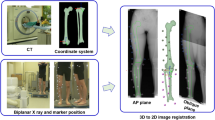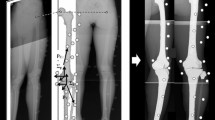Abstract
Purpose
Tibio-femoral kinematics are clearly influenced by the bony morphology of the femur. Previous morphological studies have not directly evaluated relationships between morphology and knee kinematics. Therefore, the purpose of this study was to examine the relationship between distal femur bony morphology and in vivo knee kinematics during running. It was hypothesized that the posterior offset of the transcondylar axis would be related to the magnitude of anterior/posterior tibio-femoral translation and that the rotational angle of the transcondylar axis would be related to the magnitude of internal/external knee rotation.
Methods
Seventeen contralateral (uninjured) knees of ACL-reconstructed patients were used. Distal femoral geometry was analyzed from 3D-CT data by determining the anteroposterior location (condyle offset ratio—COR) and rotational angle (condylar twist angle—CTA) of the femoral transcondylar axis. Six degree-of-freedom knee kinematics were obtained during running using a dynamic stereo radiograph system. Knee kinematics were correlated with the femoral morphologic measures (COR and CTA) to investigate the influence of femoral geometry on dynamic knee function.
Results
Significant correlations were identified between distal femur morphology and knee kinematics. Anterior tibial translation was positively correlated with the condyle offset ratio (R 2 = 0.41, P < 0.01). Internal tibial rotation was positively correlated with the condylar twist angle (R 2 = 0.48, P < 0.01).
Conclusions
Correlations between knee kinematics and morphologic measures describing the position and orientation of the femoral transcondylar axis suggest that these specific measures are valuable for characterizing the influence of femur shape on dynamic knee function.
Level of evidence
III.










Similar content being viewed by others
References
Anderson AF, Dome DC, Gautam S, Awh MH, Rennirt GW (2001) Correlation of anthropometric measurements, strength, anterior cruciate ligament size, and intercondylar notch characteristics to sex differences in anterior cruciate ligament tear rates. Am J Sports Med 29:58–66
Anderst W, Zauel R, Bishop J, Demps E, Tashman S (2009) Validation of three-dimensional model-based tibio-femoral tracking during running. Med Eng Phys 31:10–16
Anglin C, Brimacombe JM, Hodgson AJ, Masri BA, Greidanus NV, Tonetti J, Wilson DR (2008) Determinants of patellar tracking in total knee arthroplasty. Clin Biomech (Bristol, Avon) 23:900–910
Akagi M, Matsusue Y, Mata T, Asada Y, Horiguchi M, Iida H, Nakamura T (1999) Effect of rotational alignment on patellar tracking in total knee arthroplasty. Clin Orthop Relat Res 366:155–163
Brisson LJ, Gurske-DePerio J (2010) Axial and sagittal knee geometry as a risk factor for noncontact anterior cruciate ligament tear: a case-control study. Arthroscopy 26:901–906
Carpenter RD, Majumdar S, Ma CB (2009) Magnetic resonance imaging of 3-dimensional in vivo tibiofemoral kinematics in anterior cruciate ligament-reconstructed knees. Arthroscopy 25:760–766
Chandrashekar N, Slauterbeck J, Hashemi J (2005) Sex-based differences in the anthropometric characteristics of the anterior cruciate ligament and its relation to intercondylar notch geometry: a cadaveric study. Am J Sports Med 33:1492–1498
Chin KR, Dalury DF, Zurakowski D, Scott RD (2002) Intraoperative measurements of male and female distal femurs during primary total knee arthroplasty. J Knee Surg 15:213–217
Davis TJ, Shelbourne KD, Klootwyk TE (1999) Correlation of the intercondylar notch width of the femur to the width of the anterior and posterior cruciate ligaments. Knee Surg Sports Traumatol Arthrosc 7:209–214
DeFrate LE, Papannagari R, Gill TJ, Moses JM, Pathare NP, Li G (2006) The 6 degrees of freedom kinematics of the knee after anterior cruciate ligament deficiency. An in vivo imaging analysis. Am J Sports Med 34:1240–1246
Dejour H, Bonnin M (1994) Tibial translation after anterior cruciate ligament rupture. Two radiological tests compared. J Bone Joint Surg [Br] 76:745–749
Dyrby CO, Andriacchi TP (2004) Secondary motions of the knee during weight bearing and non-weight bearing activities. J Orthop Res 22:794–800
Eckhoff DG, Dwyer TF, Bach JM, Spitzer VM, Reinig KD (2001) Three-dimensional morphology of the distal part of the femur viewed in virtual reality. J Bone Joint Surg 83-A(Suppl 2):43–50
Giffin JR, Vogrin TM, Zantop T, Woo SL, Harner CD (2004) Effects of increasing tibial slope on the biomechanics of the knee. Am J Sports Med 32:376–382
Gill TJ, Van de Velde SK, Wing DW, Oh LS, Hosseini A, Li G (2009) Tibiofemoral and patellofemoral kinematics after reconstruction of an isolated posterior cruciate ligament injury: in vivo analysis during lunge. Am J Sports Med 37:2377–2385
Griffin LY, Agel J, Albohm MJ, Arendt EA, Dick RW et al (2000) Noncontact anterior cruciate ligament injuries: risk factors and prevention strategies. J Am Acad Orthop Surg 8:141–150
Grood ES, Suntay WJ (1983) A joint coordinate system for the clinical description of three-dimensional motions: application to the knee. J Biomech Eng 105:136–144
Hashemi J, Chandrashekar N, Gill B, Beynnon BD, Slauterbeck JR, Schutt RC Jr, Mansouri H, Dabezies E (2008) The geometry of the tibial plateau and its influence on the biomechanics of the tibiofemoral joint. J Bone Joint Surg [Am] 90:2724–2734
Hewett TE, Myer GD, Ford KR (2006) Anterior cruciate ligament injuries in female athletes: part 1, mechanisms and risk factors. Am J Sports Med 34:299–311
Hill PF, Vedi V, Williams A, Iwaki H, Pinskerova V, Freeman MA (2000) Tibiofemoral movement 2: the loaded and unloaded living knee studied by MRI. J Bone Joint Surg [Br] 82:1196–1198
Hirokawa S, Solomonow M, Lu Y, Lou ZP, D’Ambrosia R (1992) Anterior-posterior and rotational displacement of the tibia elicited by quadriceps contraction. Am J Sports Med 20:299–306
Isberg J, Faxén E, Laxdal G, Eriksson BI, Kärrholm J, Karlsson J (2011) Will early reconstruction prevent abnormal kinematics after ACL injury? Two-year follow-up using dynamic radiostereometry in 14 patients operated with hamstring autografts. Knee Surg Sports Traumatol Arthrosc [Epub ahead of print]. doi:10.1007/s00167-011-1399-y
Iwaki H, Pinskerova V, Freeman MAR (2000) Tibiofemoral movement 1: the shapes and relative movements of the femur and tibia in the unloaded cadaver knee. J Bone Joint Surg [Br] 82:1189–1195
Kozanek M, Van de Velde SK, Gill TJ, Li G (2008) The contralateral knee joint in cruciate ligament deficiency. Am J Sports Med 36:2151–2157
Kozanek M, Hosseini A, Liu F, Van de Velde SK, Gill TJ, Rubash HE, Li G (2009) Tibiofemoral kinematics and condylar motion during the stance phase of gait. J Biomech 42:1877–1884
Kvist J (2004) Sagittal plane translation during level walking in poor-functioning and well-functioning patients with anterior cruciate ligament deficiency. Am J Sports Med 32:1250–1255
LaPrade RF, Burnett QM 2nd (1994) Femoral intercondylar notch stenosis and correlation to anterior cruciate ligament injuries. A prospective study. Am J Sports Med 22:198–202
Li G, Rudy TW, Sakane M, Kanamori A, Ma CB, Woo SL (1999) The importance of quadriceps and hamstring muscle loading on knee kinematics and in situ forces in the ACL. J Biomech 32:395–400
Li G, Kozanek M, Hosseini A, Liu F, Van de Velde SK, Rubash HE (2009) New fluoroscopic imaging technique for investigation of 6DOF knee kinematics during treadmill gait. J Orthop Surg Res 4:6
Logan M, Dunstan E, Robinson J, Williams A, Gedroyc W, Freeman M (2004) Tibiofemoral kinematics of the anterior cruciate ligament (ACL)-deficient weightbearing, living knee employing vertical access open “interventional” multiple resonance imaging. Am J Sports Med 32:720–726
Lonner JH, Jasko JG, Thomas BS (2008) Anthropomorphic differences between the distal femora of men and women. Clin Orthop Relat Res 466:2724–2729
Markolf K, Burchfield D, Shapiro M, Shepard M, Finerman G, Slauterbeck J (1995) Combined knee loading states that generate high anterior cruciate ligament forces. J Orthop Res 13:930–935
Meyer EG, Haut RC (2008) Anterior cruciate ligament injury induced by internal tibial torsion or tibiofemoral compression. J Biomech 41:3377–3383
Moro-oka TA, Hamai S, Miura H, Shimoto T, Higaki H, Fregly BJ, Iwamoto Y, Banks SA (2008) Dynamic activity dependence of in vivo normal knee kinematics. J Orthop Res 26:428–434
Most E, Axe J, Rubash H, Li G (2004) Sensitivity of the knee joint kinematics calculation to selection of flexion axes. J Biomech 37:1743–1748
Olcott CW, Scott RD (1999) The Ranawat award. Femoral component rotation during total knee arthroplasty. Clin Orthop Relat Res 367:39–42
Papannagari R, Gill TJ, DeFrate LE, Moses JM, Petruska AJ, Li G (2006) In vivo kinematics of the knee after anterior cruciate ligament reconstruction. Am J Sports Med 34:2006–2012
Ristanis S, Stergiou N, Patras K, Vasiliadis HS, Giakas G, Georgoulis AD (2005) Excessive tibial rotation during high-demand activities is not restored by anterior cruciate ligament reconstruction. Arthroscopy 21:1323–1329
Rudolph KS, Eastlack ME, Axe MJ, Snyder-Mackler L (1998) 1998 Basmajian student award paper: movement patterns after anterior cruciate ligament injury: a comparison of patients who compensate well for the injury and those who require operative stabilization. J Electromyogr Kinesiol 8:349–362
Scarvel JM, Smith PN, Refshauge KM, Galloway HR, Woods KR (2006) Does anterior cruciate ligament reconstruction restore normal kinematics? A prospective MRI analysis over two years. J Bone Joint Surg [Br] 88:324–330
Shefelbine SJ, Ma CB, Lee KY, Schrumpf MA, Patel P, Safran MR, Slavinsky JP, Majumdar S (2006) MRI analysis of in vivo meniscal and tibiofemoral kinematics in ACL-deficient and normal knees. J Orthop Res 24:1208–1217
Shelbourne KD, Davis TJ, Klootwyk TE (1998) The relationship between intercondylar notch width of the femur and the incidence of anterior cruciate ligament tears. A prospective study. Am J Sports Med 26:402–408
Shin CS, Carpenter RD, Majumdar S, Ma CB (2009) Three-dimensional in vivo patellofemoral kinematics and contact area of anterior cruciate ligament-deficient and -reconstructed subjects using magnetic resonance imaging. Arthroscopy 25:1214–1223
Siebold R, Axe J, Irrgang JJ, Li K, Tashman S, Fu FH (2010) A computerized analysis of femoral condyle radii in ACL intact and contralateral ACL reconstructed knees using 3D CT. Knee Surg Sports Traumatol Arthrosc 18:26–31
Staeubli HU, Adam O, Becker W, Burgkart R (1999) Anterior cruciate ligament and intercondylar notch in the coronal oblique plane: anatomy complemented by magnetic resonance imaging in cruciate ligament-intact knees. Arthroscopy 15:349–359
Stijak L, Herzog RF, Schai P (2008) Is there an influence of the tibial slope of the lateral condyle on the ACL lesion? A case-control study. Knee Surg Sports Traumatol Arthrosc 16:112–117
Tashman S, Anderst W (2003) In vivo measurement of dynamic joint motion using high speed biplane radiography and CT: application to canine ACL deficiency. J Biomech Eng 125:238–245
Tashman S, Collon D, Anderson K, Kolowich P, Anderst W (2004) Abnormal rotational knee motion during running after anterior cruciate ligament reconstruction. Am J Sports Med 32:975–983
Tashman S, Kolowich P, Collon D, Anderson K, Anderst W (2007) Dynamic function of the ACL-reconstructed knee during running. Clin Orthop Relat Res 454:66–73
Varadarajan KM, Gill TJ, Freiberg AA, Rubash HE, Li G (2009) Gender differences in trochlear groove orientation and rotational kinematics of human knees. J Orthop Res 27:871–878
Victor J, Van Doninck D, Labey L, Van Glabbeek F, Parizel P, Bellemans J (2009) A common reference frame for describing rotation of the distal femur: a ct-based kinematic study using cadavers. J Bone Joint Surg [Br] 91:683–690
Yoshino N, Takai S, Ohtsuki Y, Hirasawa Y (2001) Computed tomography measurement of the surgical and clinical transepicondylar axis of the distal femur in osteoarthritic knees. J Arthroplasty 16:493–497
Yoshioka Y, Siu D, Cooke TD (1987) The anatomy and functional axes of the femur. J Bone Joint Surg [Am] 69A:873–880
Conflict of interest
The authors declare that they have no conflict of interest.
Author information
Authors and Affiliations
Corresponding author
Rights and permissions
About this article
Cite this article
Hoshino, Y., Wang, J.H., Lorenz, S. et al. The effect of distal femur bony morphology on in vivo knee translational and rotational kinematics. Knee Surg Sports Traumatol Arthrosc 20, 1331–1338 (2012). https://doi.org/10.1007/s00167-011-1661-3
Received:
Accepted:
Published:
Issue Date:
DOI: https://doi.org/10.1007/s00167-011-1661-3




